Marvel at Israel's biblical depiction as a nation entwined with divine destiny, beckoning readers to explore its historical and prophetic significance.
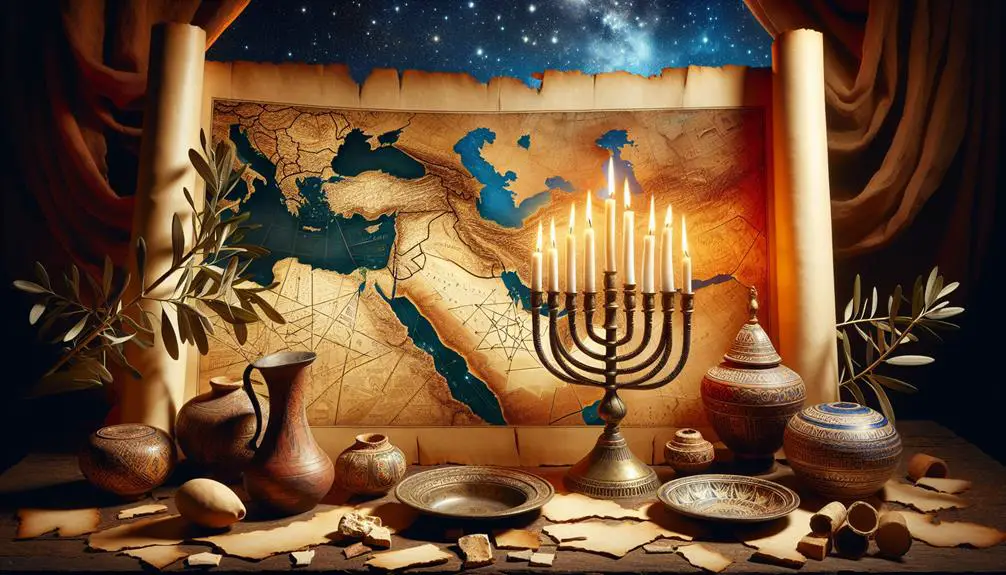
Is Israel a Country in the Bible
Imagine you're exploring the ancient maps described in the Bible, where Israel is depicted not just as a territory but as a central figure in a divine narrative.
You've probably heard of Israel's profound significance in religious texts, but have you considered its implication as a country within the biblical context?
The distinction between ancient descriptions and modern geopolitical boundaries raises intriguing questions about identity, prophecy, and the very definition of a nation.
As you ponder the historical and theological underpinnings of Israel, you'll find yourself at the crossroads of faith and history, contemplating how ancient narratives influence contemporary understanding.
Key Takeaways
- Israel's biblical origins and covenant with God establish it as a significant theological entity, not a modern country.
- Ancient texts frame Israel more as a community of faith than a geographical nation-state.
- Biblical narratives focus on Israel's spiritual identity and covenantal relationships rather than defining territorial borders.
- Archaeological and scholarly interpretations show that "Israel" in the Bible refers to a people chosen by God, transcending modern political definitions.
The Biblical Genesis of Israel
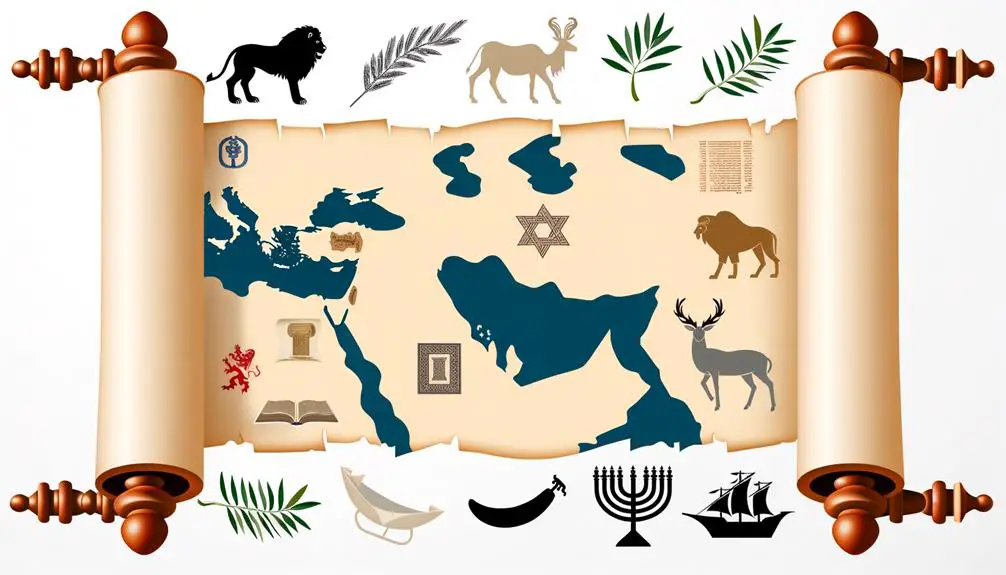
In tracing the origins of Israel, the Bible presents a narrative that begins with the covenant between God and Abraham, marking the foundational moment for the nation's biblical genesis. This event, deeply embedded within the patriarchal narratives, establishes a lineage that would evolve into the people of Israel. The covenant promises, which entail land, descendants, and blessing, aren't only pivotal for Abraham's immediate family but also signify the embryonic stage of Israel as a nation within the biblical framework.
You'll find that these patriarchal narratives are crucial for understanding Israel's formation from a biblical perspective. They're not merely historical accounts but serve as theological reflections on the origins and identity of a people chosen by God. The covenant, reiterated and expanded to Abraham's descendants, Isaac and Jacob, underscores a divine plan unfolding through generations. It's through these narratives that the Bible articulates the concept of a chosen people, destined to inhabit a promised land.
Analyzing these texts, it's evident that the biblical genesis of Israel is intricately linked to covenant promises. These promises aren't just about land or progeny but encompass a relationship between God and a people. This relationship is characterized by faithfulness, obedience, and a sense of divine mission.
Hence, when discussing Israel's genesis in the Bible, it's imperative to consider the theological dimensions of these patriarchal narratives. They're foundational not only in establishing a historical lineage but also in shaping the identity and destiny of Israel according to the biblical worldview.
Israel's Significance in Ancient Texts

You must consider the profound implications of Israel's biblical origins and its central role in prophecy to understand its significance in ancient texts.
These elements not only define its historical identity but also shape the narrative frameworks within which ancient societies viewed it.
Analyzing these aspects reveals the multifaceted roles Israel played in religious, cultural, and geopolitical contexts.
Biblical Origins of Israel
Tracing back through ancient texts, Israel's origins emerge as central to the narratives and theological constructs found within the Bible. The historical and spiritual identity of Israel is deeply intertwined with:
- Patriarchal narratives that recount the lives and journeys of figures such as Abraham, Isaac, and Jacob. These stories not only define the early lineage of Israel but also embed moral and ethical lessons within the fabric of its culture.
- Covenant promises made by God to these patriarchs, which establish a profound relationship between the divine and Israel. These covenants promise land, blessing, and a distinguished role for Israel among the nations.
- The establishment of Israel as a nation through these ancient texts, marking its significance not just historically, but also theologically within the biblical canon.
This foundation is crucial for understanding Israel's intricate role in biblical history and its enduring significance.
Israel's Role in Prophecy
Israel's role in biblical prophecy underscores its pivotal position within ancient texts, shaping interpretations and expectations of future events. You'll find that Israel is central to many prophecies, serving as a focal point for Messianic expectations and apocalyptic visions.
These prophecies often highlight a future where Israel plays a key role in the unfolding of divine plans, particularly in the context of redemption and the end times. Scholars analyze these texts to understand the complex relationship between historical events and prophetic visions, noting how Israel's destiny is intertwined with broader themes of hope and divine intervention.
This deep interconnection elevates the nation's significance, making it a nexus of theological inquiry and a beacon for interpreting the fulfillment of ancient promises.
Territorial Definitions and Disputes
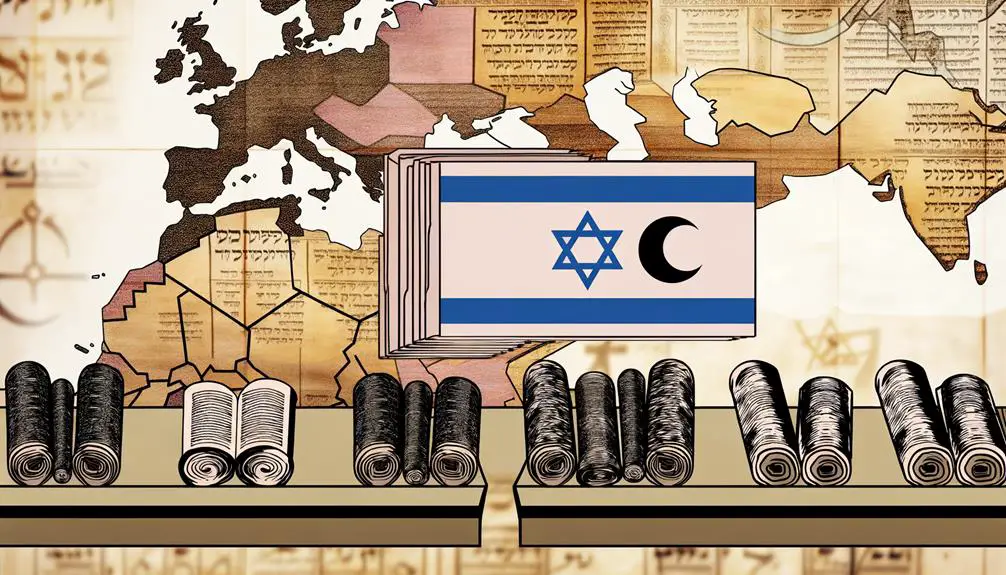
You must now turn your attention to how the Bible defines Israel's territorial boundaries and how these descriptions have fueled modern territorial disputes.
The ancient texts offer a foundation for understanding the complex, often contentious, nature of current land conflicts in the region.
Ancient Boundaries Explained
Understanding the ancient boundaries of Israel requires an examination of historical and biblical texts to define its territorial disputes and definitions accurately. The region's history is deeply intertwined with Canaanite cultures and neighboring empires, which shaped its early territorial framework. Here are three key points to consider:
- Historical Context: Biblical narratives position Israel amidst various Canaanite entities, highlighting frequent interactions and conflicts that influenced territorial claims.
- Neighboring Empires: The influence of Egyptian, Assyrian, Babylonian, and later Persian empires played significant roles in shaping Israel's boundaries, often through conquest and treaties.
- Archaeological Evidence: Excavations provide insights into ancient settlements, fortifications, and borders, offering a tangible glimpse into the fluctuating boundaries of biblical Israel.
This analysis helps delineate the complex mosaic of ancient territorial definitions and disputes surrounding Israel.
Modern Territorial Conflicts
Transitioning from ancient times, modern territorial conflicts continue to shape the geopolitical landscape of Israel, involving complex disputes over land and sovereignty. These conflicts are deeply rooted in historical claims and religious significance, challenging the process of peace negotiations.
You'll find that international law plays a pivotal role in these discussions, yet its application often becomes a point of contention between involved parties. The quest for a resolution is further complicated by differing interpretations of legal and historical precedents, making the path to peace elusive.
As you delve deeper, it's clear that these territorial disputes aren't just about land but also about identity, heritage, and the right to self-determination, underscoring the intricacies of achieving lasting peace in the region.
The Role of Prophecy

In exploring the role of prophecy within the biblical context of Israel, it's crucial to recognize its profound impact on shaping religious and historical narratives. Prophecies in the Bible often involve future predictions and are admired for their prophetic accuracy. These elements not only influenced the ancient Israelites' understanding of their relationship with the divine but also continue to inform contemporary interpretations of Israel's place in a broader religious and historical context.
Here are three key aspects to consider:
- Future Predictions: Prophecies provided a roadmap for the Israelites, offering glimpses into future events. This foresight into what was believed to be divinely ordained occurrences helped to guide the nation through periods of uncertainty and change.
- Prophetic Accuracy: The accuracy of prophecies, as recorded in biblical texts, served to reinforce the faith of the Israelite community. Instances where predictions came to fruition bolstered belief in the divine connection and guidance provided through these messages.
- Historical and Religious Narratives: Prophecy played a pivotal role in weaving the historical and religious tapestry of Israel. The prophetic narratives contributed to a collective identity, deeply rooted in the belief of a chosen people guided by divine foresight and intervention.
Understanding the role of prophecy requires an analytical approach that appreciates its multifaceted impact on Israel's development. It's through this lens that one can grasp the intricate relationship between divine foresight, historical events, and the perpetuation of religious belief and identity within the biblical framework.
Nations and Identity in Scripture
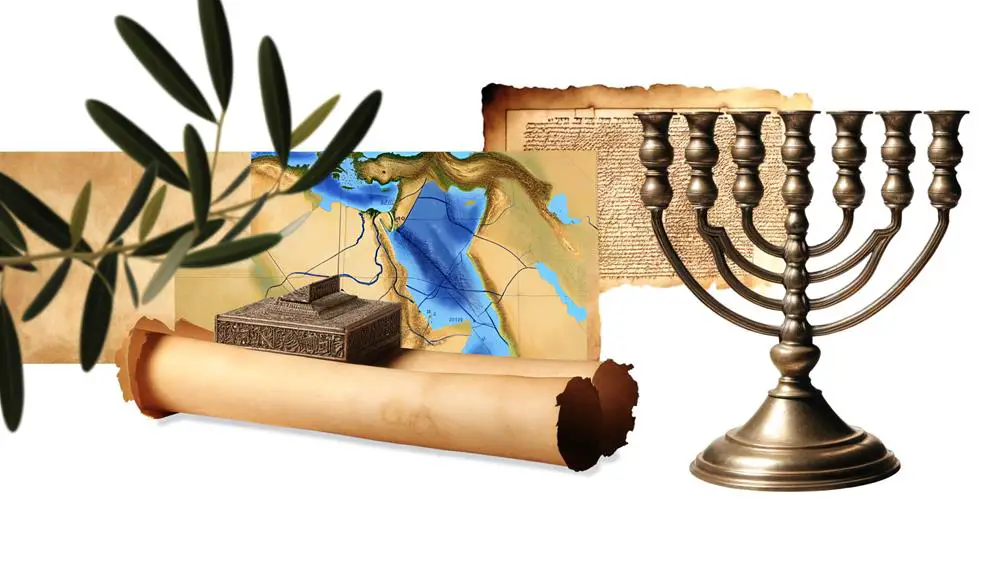
Building on the pivotal role of prophecy, it's essential to explore how scripture delineates nations and their identities, further weaving the complex tapestry of biblical history and theology. The Bible isn't just a religious text but also a historical document that reflects the intricate relationships between various ethnic groups and their spiritual journeys. This interaction between ethnic identities and religious migrations shapes the narrative of scripture, offering insights into the divine plan for humanity.
In scripture, nations are often defined not just by territorial boundaries but by shared beliefs, customs, and divine covenants. This underscores the significance of faith as a unifying factor for communities, transcending mere geographic or ethnic considerations. The table below highlights key nations and their scriptural identities, illustrating the diversity and depth of these ancient communities:
Nation |
Scriptural Identity |
|---|---|
Israel |
Chosen people, covenant with God |
Egypt |
Place of enslavement, but also refuge |
Babylon |
Exile and testing ground for faith |
Assyria |
Adversary, yet instrument of divine will |
Rome |
Superpower, backdrop for New Testament |
This overview underscores the dynamic interplay between ethnic identities and religious migrations across scripture. Nations aren't static entities; they evolve, influenced by divine interventions, prophetic declarations, and the faithful's responses to these divine cues. Understanding this fluidity is crucial to grasp the full scope of biblical narrative, where historical events and theological insights intertwine, shaping the collective memory and identity of the faithful. This exploration reveals the Bible's nuanced perspective on nations and identity, inviting readers to appreciate the rich mosaic of human-divine interaction documented in sacred scripture.
Israel's Historical and Theological Context
To understand Israel's role within the biblical narrative, it's crucial to delve into its historical and theological context, which reveals the nation's unique relationship with the divine. This connection isn't merely geopolitical but deeply woven into the fabric of cultural practices and religious rituals that define the Israelite identity. From the covenant with Abraham to the exodus from Egypt and the establishment of the kingdom under David and Solomon, each event underscores a divine purpose and guidance.
Here are three key aspects to consider:
- Covenant Relationship: Israel's origin story is fundamentally tied to a series of covenants, especially the ones made with Abraham, Moses, and David. These agreements established Israel as a chosen nation, tasked with a divine mission and set apart by their adherence to God's laws and commands.
- Cultural Practices: Beyond the religious rituals, day-to-day life in ancient Israel was deeply influenced by commandments that governed food, clothing, and social justice. These practices weren't mere traditions but served to distinguish Israelites from their neighbors and deepen their communal bond with God.
- Prophetic Tradition: The role of prophets was central in Israel's history, acting as intermediaries between God and the people. They not only foretold future events but also called the nation back to faithfulness and adherence to the covenant. This prophetic tradition underscored the dynamic nature of Israel's relationship with God, marked by periods of both closeness and estrangement.
Understanding these elements sheds light on the complex tapestry of Israel's historical and theological identity, framing its narrative within a broader divine story.
The Modern Interpretation of Biblical Israel
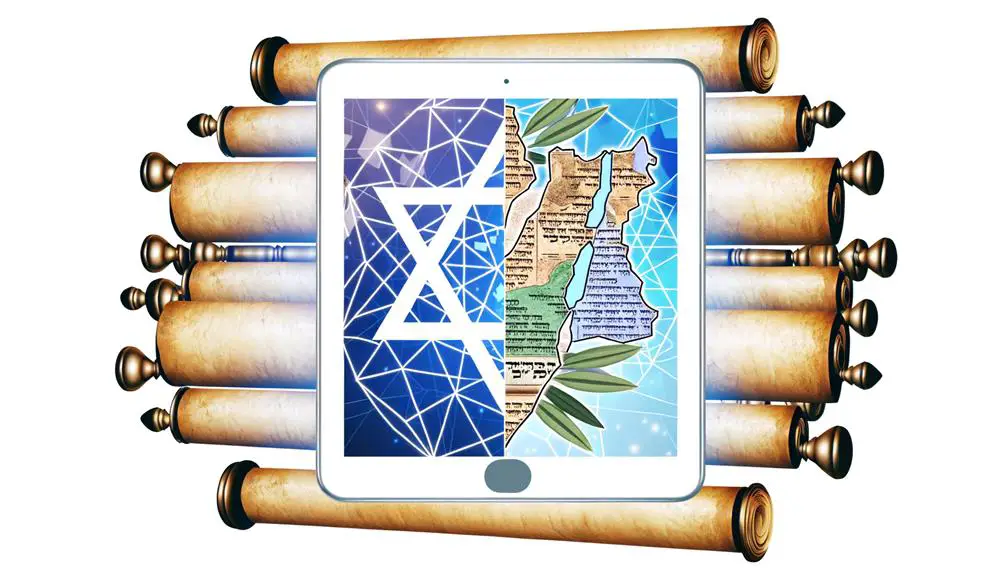
Exploring the modern interpretation of Biblical Israel, we find a landscape rich with scholarly debate and varying perspectives that challenge traditional understandings. This discourse navigates through a complex interplay of cultural perceptions and archaeological evidence, providing a nuanced view of Israel's biblical narrative. You delve into a realm where historical and theological dimensions intertwine, demanding a critical examination of ancient texts and material culture.
Cultural perceptions have significantly influenced the contemporary interpretation of Biblical Israel. These perceptions aren't static; they evolve with societal changes and advances in scholarly thought. You observe how modern interpretations often reflect the current socio-political contexts, thereby shaping the understanding of biblical narratives in ways that differ markedly from ancient interpretations. This dynamic interrelation underscores the importance of considering cultural context when analyzing biblical references to Israel.
Archaeological evidence plays a pivotal role in elucidating the historical reality of Biblical Israel. You witness how excavations and discoveries challenge and refine scholarly understanding of biblical events and figures. This evidence provides tangible links to the past, offering insights that textual analysis alone can't afford. Yet, the interpretation of archaeological findings isn't without controversy. Debates among scholars over the dating and significance of artifacts illustrate the complexities involved in reconstructing Israel's biblical past.
Frequently Asked Questions
How Do Contemporary Religious Groups Interpret the Concept of Israel Differently?
You'll find that contemporary religious groups interpret the concept of Israel with significant variance. Some view it through a lens of spiritual symbolism, seeing it as emblematic of broader spiritual truths or states.
Others, particularly within certain Christian and Jewish sects, align it closely with Messianic expectations, believing it plays a pivotal role in prophetic fulfillment.
This divergence in interpretation underscores the complexity and depth of religious perspectives on Israel's significance today.
What Are the Archaeological Findings That Support or Contradict the Existence of Israel as Described in the Bible?
You'll find that archaeological findings on Israel's existence as described in the Bible are mixed. Dating methodologies and pottery styles play critical roles in this analysis.
Some excavations support biblical narratives, showing settlements and artifacts from periods mentioned. However, discrepancies in pottery styles and dating sometimes contradict these accounts.
Scholars continue to debate these findings, aiming to reconcile archaeological evidence with historical and religious texts, making it a complex and ongoing investigation.
How Have Political Movements, Such as Zionism, Influenced the Modern Understanding of Biblical Israel?
Political movements like Zionism have reshaped your understanding of biblical Israel.
Zionist ideology, rooted in modern nationalism, reinterprets ancient narratives to justify contemporary political aims. This perspective transforms ancient texts into a framework for modern statehood, influencing how you perceive biblical history.
What Role Does the Concept of Israel Play in Interfaith Dialogues and Religious Tolerance Discussions?
In interfaith dialogues, the concept of Israel often serves as a bridge, fostering unity among diverse religious communities.
Consider a hypothetical scenario where Jewish, Christian, and Muslim leaders gather to discuss shared biblical heritage. This setting highlights how Israel's rich history within religious narratives promotes interfaith unity.
How Do the Teachings About Israel in the Bible Influence Current Geopolitical Conflicts in the Middle East?
The teachings about Israel in the Bible deeply influence current geopolitical conflicts in the Middle East. You'll find that interpretations of these texts often enter discussions around peace negotiations, framing Israel's cultural heritage and historical claims.
This perspective shapes both political rhetoric and public opinion, complicating efforts toward reconciliation and understanding. Analyzing this influence reveals how ancient narratives continue to impact modern-day dialogues, underscoring the complexity of achieving lasting peace in the region.
Conclusion
In the tapestry of biblical history, Israel emerges as a thread intricately woven into the fabric of divine narrative and human identity. Through ancient texts and prophetic visions, its contours are sketched, evoking a land steeped in spiritual and territorial significance.
Yet, as history's loom continues its work, the interpretation of Israel's biblical identity evolves, mirroring the shifting sands of theological and scholarly inquiry. In this complex interplay of past and present, Israel remains a pivotal axis around which debates of faith, history, and identity orbit.



Sign up